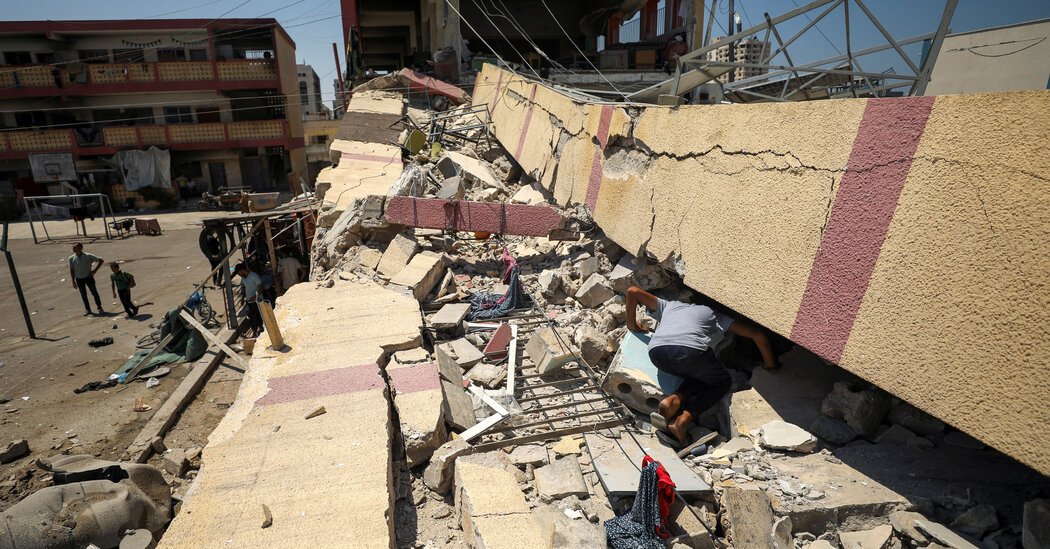
The Biden administration is again putting its diplomatic heft behind an effort to dislodge the logjam in negotiations between Israel and Hamas over a cease-fire to end the 10-month-long war in Gaza, and American officials have voiced optimism over the potential for a breakthrough.
Israeli and Hamas officials are striking a different tone. Both sides have poured cold water on the idea that a deal could be imminent, saying that mediators’ efforts — and the latest American proposal aimed at bridging gaps between the two sides — have failed to resolve some of the most substantive disputes in the talks.
On Monday, Secretary of State Antony J. Blinken, making his ninth visit to Israel since the war began, emerged from a three-hour-long meeting with Prime Minister Benjamin Netanyahu and announced that the Israeli leader had assented to the new U.S. proposal intended to bridge the differences between the two sides, introduced at talks in Qatar last week.
But Israeli and Hamas officials familiar with the talks said the U.S. plan left major disagreements mostly unresolved. Hamas quickly dismissed the American-led framework as conforming to Mr. Netanyahu’s conditions, which he has stiffened in recent weeks.
On Tuesday, as Mr. Blinken traveled to Egypt and Qatar to continue pushing for an agreement, Hamas issued a statement criticizing the latest American proposal as “a reversal” of what Hamas had agreed to in early July and that U.S. officials had called a breakthrough.
Hamas officials have said they welcome President Biden’s framework for a cease-fire, although they too have requested amendments to proposals presented to them. They also have noted that Mr. Netanyahu has toughened Israel’s stance on several points of contention in the talks since May.
On Monday night, President Biden appeared to join Mr. Netanyahu in placing the onus on Hamas, rather than Israel, for dragging its feet on a possible cease-fire. “Hamas is now backing away” from a cease-fire, he said.
The negotiations have taken on renewed urgency following the assassinations of Hamas’s political leader, Ismail Haniyeh, in Tehran and Fuad Shukr, a senior Hezbollah commander, in Beirut in late July. Hezbollah and Iran have vowed to retaliate, and there is a danger the war in Gaza could grow into a regional armed conflict.
The Biden administration hopes that even the prospect of progress toward a cease-fire might persuade Iran and Hezbollah to hold off or blunt their reprisals.
Under the new U.S. proposal, Israeli troops would be able to continue to patrol part of the Gazan border with Egypt, albeit in reduced numbers — one of Mr. Netanyahu’s core demands, according to four officials familiar with the talks, who spoke on condition of anonymity because they were not authorized to speak publicly.
That is likely a non-starter for Hamas, which has consistently called for a complete Israeli withdrawal from the Gaza Strip. Egypt has also voiced staunch objections to a long-term Israeli presence in that area, known as the Philadelphi Corridor.
Cairo has maintained that it will not accept Israeli troops remaining in the Philadelphi Corridor, which Egyptian officials say would pose national security concerns and would likely anger the Egyptian public.
In a sign of Egypt’s frustrations, state-controlled media outlets, which serve as government mouthpieces, have escalated their language against Israel in recent days, accusing it of trying to pick a fight with Egypt over the corridor to delay progress on a cease-fire in Gaza.
“Netanyahu doesn’t want a cease-fire, so he is creating an artificial problem with Egypt,” a former general, Samir Farag, said on one talk show that aired Monday night.
During the cease-fire talks that ended last Friday, U.S. officials also asked to delay in-depth conversations over Israel’s demand to screen displaced Palestinians returning to northern Gaza for weapons, another key stumbling block, according to two officials familiar with the talks.
Over the past several months, U.S. officials have repeatedly sought to drum up momentum in the negotiations mediated by Egypt and Qatar. In May, President Biden endorsed an Israeli-backed cease-fire proposal, saying both sides had reached a “decisive moment.” The talks crept along for months until the Hamas counterproposal in July, and then stalled.
The talks now appear to be at risk of reaching yet another dead end.
The United States, alongside Egypt and Qatar, have called for another summit in Cairo before the end of the week. Two Israeli officials, who also spoke on condition of anonymity, said that a date for the meeting had yet to be set and that it was unclear where it might be held. Hamas did not participate in the last round of talks, and it has not said whether it will agree to join this time.
The roller-coaster of alternating hope and anguish has tormented millions of Palestinian civilians in Gaza, who have endured 10 months of war and privation and are desperate for a cease-fire. At least 40,000 people have been killed in military operations, a majority of them civilians, Gaza health officials say.
The lack of progress in talks has also tortured relatives of the roughly 109 hostages still held in Gaza. Some have asked why the Biden administration has not put more pressure on Mr. Netanyahu, whose nickname is Bibi, to compromise.
“He’s hiding behind the Americans,” said Gilad Korngold, 63, whose son Tal Shoham is one of the hostages. “I don’t understand the Americans. They really need to tell Bibi: Look, we’re your friends and protectors, but you’re going to go free the hostages. This is the time.”
Isabel Kershner contributed reporting from Jerusalem, and Vivian Yee and Emad Mekay from Cairo.







